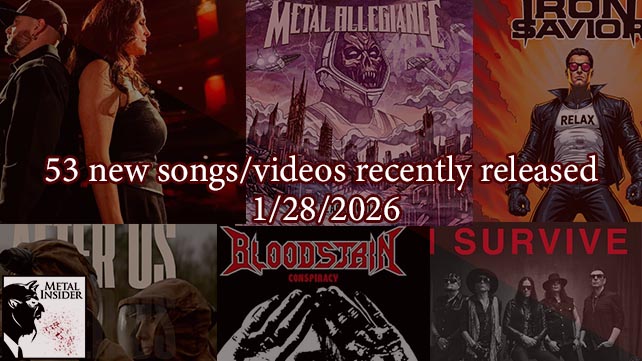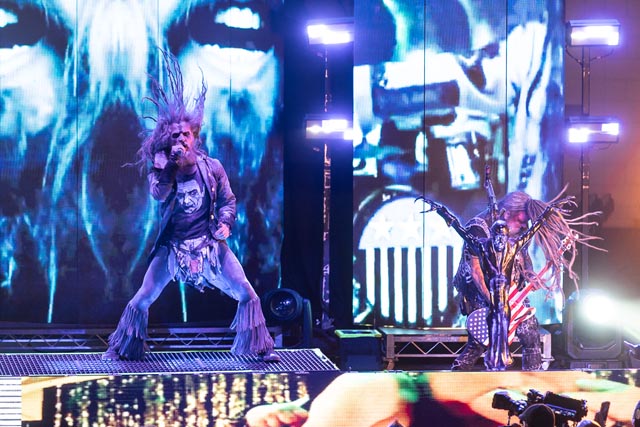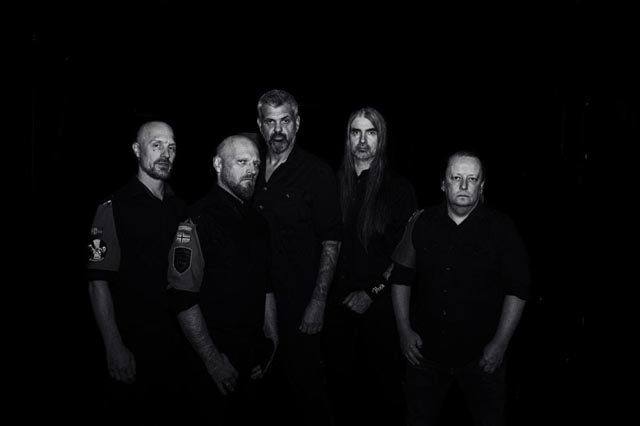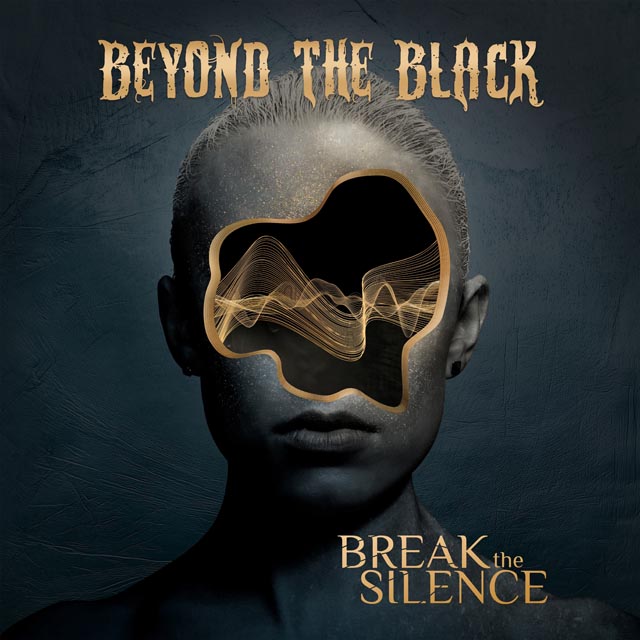 Teratogenesis (2012)
Teratogenesis (2012)
You put out an EP next via Scion A/V. How did that come about?
They hit us up and wanted to do the EP. At first we thought that was kind of weird and said we would look into it, but it just seemed like a win-win for us. They would pay for the recording and for the music video that helped promote the record. They did the whole promotional campaign around the tour that we did for that campaign, so it was definitely a really overwhelmingly positive experience. That one was different because we used Zeuss as a producer as opposed to Pete Rutcho, we just wanted to switch things up. It was great working with Zeuss, deciding who would be behind the mixing board and to have someone to bounce ideas off and contribute thoughts here and there.
Did you have any initial hesitation about working with a car company?
I think a little bit at first, but the more we researched it we realized that they weren’t going to tell us how to write our songs, they are going to slap their logo on the CD just like any label would slap their logo on a CD. So if a company is doing the whole thing and financing it, I don’t have a problem with it. It’s just their logo instead of having a logo and being the Scion logo. It wasn’t like we were doing infomercials or anything like that. I wish they gave me a Scion, that would have been good. To their credit, they really helped the scene out in my opinion.
 Revocation (2013)
Revocation (2013)
Why wait so long to have a self-titled record?
I think we felt that the material at that time developed so much that self-titling it was like saying “Here is the Revocation sound.” This was the sound that we were kind of working for and our goal was sort of achieved with that one. I’m just a fan of bands’ self-titling records especially when they make a really strong artistic statement.
Back to your self-titled album, does anything about that stand out in terms of touring or experiences or the studio?
We worked with Pete Rutcho again, so that was similar. It wasn’t anything that stands out in my mind. You go through these cycles and they are about two years long. You work on writing a record and you flesh that out for however long, then you go into record it, which takes about a month. Then you go into a three to four month waiting period for the record to come out and then it’s go time and you’re just catapulted into this trajectory of tours and US touring, Canadian touring, touring Europe and then trying to hit other markets that you don’t get to which can build up more and more when you get more popular. And then the tour winds down and you’re thinking about the next one and the whole thing repeats again.
It doesn’t seem like you’ve had any time off.
No, luckily we just write a lot. I write a lot when I’m home. I don’t just wait around and plan to start a month before I go into the studio, that’s just not how I work. If we finished recording a record, the next day I write a riff and record it if I like it. I don’t want to put it off if the creative spark is there, I want to try to capture that, even if i don’t end up really investigating it for two or six months down the line. I still want to have that idea that I can then come back to and try to make it back into a song.
Do you have songs stockpiled for the next record already?
Yeah, I’ve got some riffs already in the works. Plus we’ve a good period of down time. There’s that little sweet spot when you’re at home for a few months in a row in between when you’ve finished recording a record and when the record comes out. You almost don’t want to be touring that much in my opinion, because you want the maximum impact of the record to hit. It’s good to have some down time and maximize your impact when the new record comes out. You don’t want to be over-touring on a record that might be over 2 years old or something.
 Deathless (2014)
Deathless (2014)
That was your first album with Metal Blade. What led to you changing labels – your Relapse deal expired?
Yeah, it’s a contract just like any business agreement. So we shopped around and got a lot of offers from other labels and in the end we went with the best business decision we could make.
It seems like your presence might have increased. Would you agree?
Yes. That was a really big record for us. First of all, we had a bigger budget so there was more money to go around for the recording and for publicity and press, so I think that helped get us on more people’s radars. It was our first album with Metal Blade so I think they wanted us to come out guns blazing. And I think it’s interesting how some people always go back and say “Their first record was their best,” but I really feel like we get better and better with each release. I’m really passionate about the stuff we write. I think we improve certain elements of our sound every time. If you think of your music as a product that is going out to a market base, I think that Deathless was the best product we had to date. The production was really crisp but organic in the songwriting. Everything about that record I think there was a lot of thought and effort put into that one. It was nice that our fans really embraced it and that the label working with us recognized us as a new band on the label. I remember getting calls during meetings from the label and they were like “Wow!” Usually a label picks one song and says “this could be a single” but here it was like “every song could be something that we release.” There was a lot of excitement, and it was very affirming as a musician. We write songs for ourselves first and foremost, but it’s always nice when the people you’re working with or your fan base really embraces something. I think by and large, the Deathless record, in terms of sales, it was definitely the biggest record that we’ve done.
Do you care about sales, particularly?
Yeah, I think it’s good when people go out and support music that they like. There’s different ways of looking at it. We’re not making millions on record sales, but it’s an indicator of your popularity. What people don’t understand is that there are so many factors that contribute to what makes a band successful. One of the biggest ones is touring and how much money can you gather from different promoters when you hit the road. People still look at a band’s first week sales in some regard because it is an indicator that x amount of people went out with their hard-earned money to buy this record when they could probably just get it for free or stream it online. It’s an indicator of how loyal your fan base is. Every little bit helps. First week record sales are not the be-all end-all. There’s no substitute for just going out there and touring, but first week sales definitely help.

Great Is Our Sin (2016)
Most people haven’t heard the new album yet. What can you say about it that makes it stand out from the rest of your catalog?
Well, we have a new drummer, Ash [Pearson]. He really killed it. That’s one new thing about the record. Other than that it was a similar writing process. We’re all really passionate about the new songs on Great is Our Sin. I feel like with Deathless, we really turned a corner and now, we are really continuing down the path. So if you were a fan of Deathless, there’s a good chance that you’ll think the new album is even better.
[youtube]https://youtu.be/wTdDCPLjt70[/youtube]
Tour Survival Guide
The day after the album is released on July 23rd, you start on the Summer Slaughter tour. What do you always bring with you on tour?
If you’re traveling internationally, you obviously need to have passport, phone charger and different plugs for different outlets and stuff like that. Be prepared with that. And of course, hygiene. You need a toothbrush, floss. There’s nothing more annoying than having something stuck in your teeth and no way of getting it out. I don’t have trinkets that I bring out. I don’t even have a laptop. It’s not like I have all these extra items that I bring out. I’m pretty boring in that sense. I guess besides the major amps that we have on stage, I like to bring out a small practice amp because I like to warm up before shows to hear myself, or just go off to a quiet place to work on music that’s not Revocation, like jazz or learning a solo transcription just to keep myself engaged in music and keep my mind sharp. On tour you get really good at playing the same seven or eight songs every night, and you don’t get to do much else. But I really love the guitar and I love practicing so it’s almost like a meditation thing for me. I need to go off into the wilderness sometimes and have my little battery-powered amp and spend a couple hours by myself just working on music.
Do you record on the road at all?
Not really, I’ll record riffs into my phone but I usually wait til I’m at my desktop to gather those ideas. But if I was just sitting here with my guitar I would just record it on the voice memo thing.
If you’re going out on tour for a month, how many changes of clothes would you bring?
About seven shirts, a couple pairs of pants. Mainly underwear and socks. I can wear a shirt a couple days in a row, it doesn’t bug me. I don’t need to have a crisp clean shirt every day. So socks and underwear mostly. Especially socks if it is super hot out and you’re just sweating. You never know when you’re going to get to do laundry again, so it’s nice to have a few extra clean pairs. I try to do laundry once every week and a half or two weeks. Sometimes it’s longer so you just try to find times when you can get it done.













